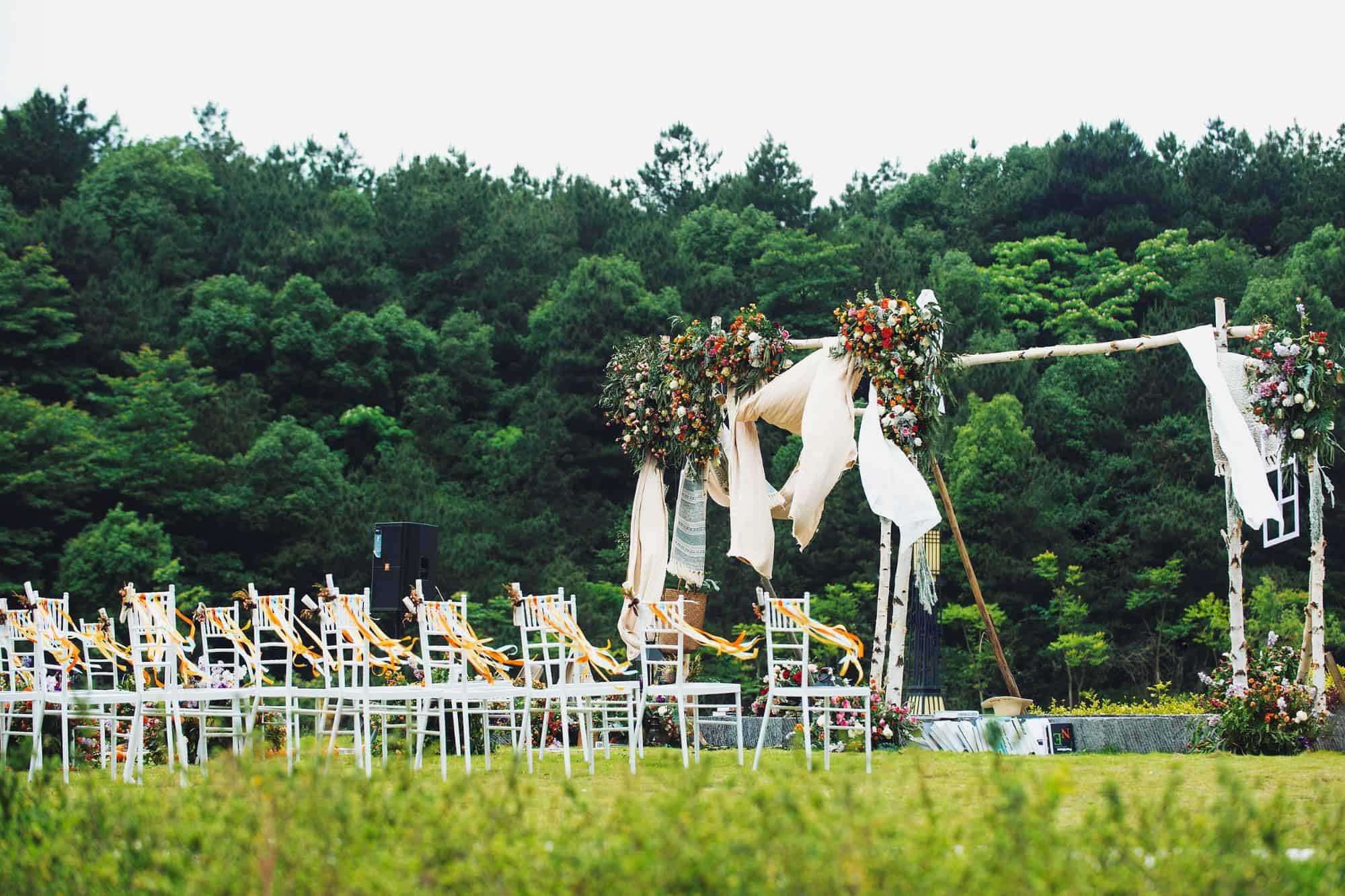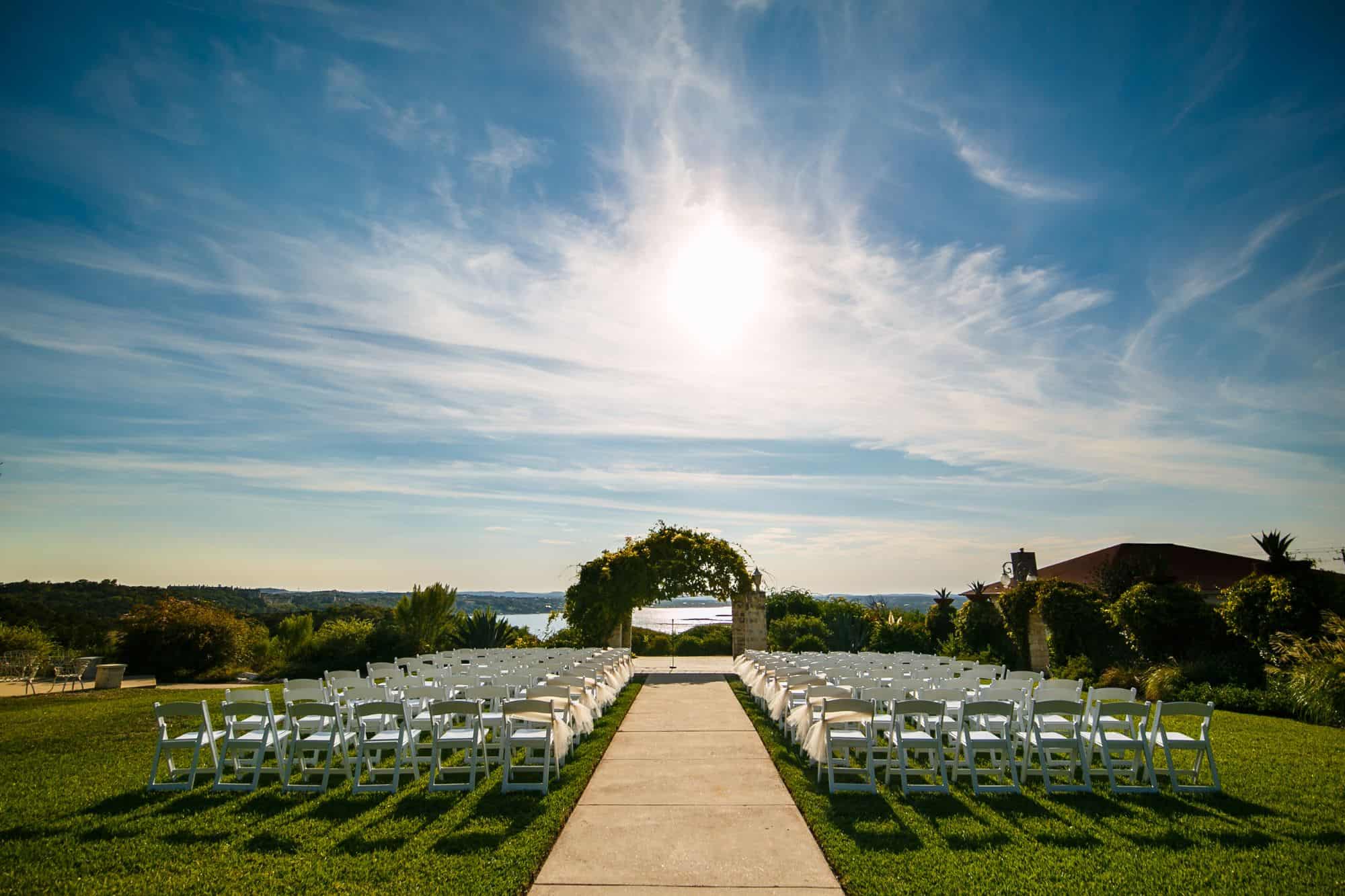An outdoor wedding is a ceremony held in a natural, open-air setting such as a garden, park, vineyard, or beach.
Outdoor weddings allow couples to celebrate their big day surrounded by the beauty of nature, offering a unique, picturesque atmosphere.
This type of wedding often requires more logistical planning than indoor ceremonies, as it involves handling weather uncertainties, guest comfort, and venue-specific details.
However, with proper planning, outdoor weddings can be an unforgettable experience that blends personal style with natural beauty.
Let’s get straight to the point
An outdoor wedding is a ceremony held in open-air venues like gardens, beaches, or vineyards, offering natural beauty and a unique atmosphere.
Planning involves choosing the right venue, ensuring guest comfort, managing catering, and handling logistics like weather, sound, and lighting. Popular venues include gardens, beaches, rustic barns, and vineyards.
Outdoor weddings provide benefits like spacious settings, personalised décor, and cost savings, but challenges like unpredictable weather and limited facilities require careful preparation.
With thoughtful planning, an outdoor wedding can be a stunning and memorable celebration.
How Do You Plan an Outdoor Wedding?
Planning an outdoor wedding involves more than just choosing a beautiful location. It requires careful attention to details such as selecting the right venue, accommodating guest comfort, managing catering, and arranging for logistics like sound, lighting, and facilities.
1. How Do You Choose the Right Outdoor Wedding Venue?
Choosing the right venue for an outdoor wedding is the most important decision. The venue sets the tone for the entire event, and each location offers different advantages and challenges.
- Match the venue to your style: Choose a venue that aligns with your vision for the day. For example, gardens offer a romantic and peaceful atmosphere, while beaches provide a relaxed and casual vibe.
- Capacity: Ensure the venue can comfortably accommodate all your guests. Outdoor spaces often have flexible layouts, but it’s still essential to make sure there’s enough room for seating, activities, and dining.
- Weather considerations: Outdoor weddings are subject to unpredictable weather. Always have a backup plan, such as renting a tent or having access to an indoor space nearby.
- Accessibility: Ensure the venue is accessible for all guests, including those with mobility needs. Check for parking facilities and ease of access from nearby hotels or accommodations.
2. How Do You Ensure Guest Comfort at an Outdoor Wedding?
One of the biggest challenges of an outdoor wedding is ensuring the comfort of your guests. Depending on the weather and location, special considerations must be made.
- Weather-appropriate amenities: For hot weather, provide fans, cooling stations, or shaded areas. In cooler temperatures, offer blankets, heaters, or serve warm drinks.
- Comfortable seating: Outdoor venues often require setting up temporary seating. Ensure that chairs are comfortable and suitable for the terrain, especially for longer ceremonies.
- Restroom facilities: Some outdoor venues may not have restrooms. Renting portable restrooms with sanitation stations is a must for guest convenience.
3. How Do You Decorate for an Outdoor Wedding?
Decorating for an outdoor wedding should enhance the natural beauty of the surroundings rather than compete with it. Focus on simple, elegant touches that complement the environment.
- Nature as décor: Let the natural landscape serve as the primary décor. Use minimal decorations to highlight the beauty of the surroundings. For example, a vineyard requires fewer decorations because of the lush greenery.
- Windproof decorations: Outdoor settings can be windy, so secure your décor properly. Weighted vases, heavy tablecloths, and sturdy floral arrangements are ideal for preventing accidents.
- Lighting: If your outdoor wedding extends into the evening, consider using string lights, lanterns, or candles to create a warm, inviting atmosphere.
4. What Catering Considerations Are Important for an Outdoor Wedding?
Catering for an outdoor wedding comes with unique challenges. Without the amenities of an indoor kitchen, it’s crucial to hire experienced caterers who can handle outdoor logistics.
- Experienced outdoor caterers: Choose caterers who are familiar with outdoor events. They should be able to manage food preparation and service under less-than-ideal conditions, such as limited kitchen facilities or unpredictable weather.
- Food storage: Ensure that perishable items are kept at the correct temperature. Coolers or insulated containers are essential to keep food safe and fresh.
- Local and seasonal ingredients: Opt for local and seasonal ingredients, which not only support the community but also ensure that the food is fresh and appropriate for the season.
5. What Sound and Lighting Arrangements Are Needed for an Outdoor Wedding?
Sound and lighting are critical for creating the right ambience at an outdoor wedding. With open spaces and the absence of walls, sound can disperse easily, and lighting may need to be carefully planned as natural light fades.
- Invest in a quality sound system: Outdoor weddings often require microphones, speakers, and amplifiers to ensure everyone can hear speeches, vows, and music. The open air can carry sound away, so professional sound equipment is a must.
- Lighting for the evening: If the wedding runs into the evening, ambient lighting will create a magical atmosphere. String lights, lanterns, and candles can be used to add a soft, romantic glow.
What Types of Venues Can Host an Outdoor Wedding?
Outdoor weddings can take place in a variety of locations, each offering its own set of benefits and challenges. Below are some of the most popular options:
1. Gardens
Garden venues are perfect for couples looking for a romantic and serene setting. The abundance of flowers and greenery provides a naturally beautiful backdrop that requires minimal decoration. Garden weddings are ideal for spring and summer when the flora is in full bloom.
2. Beaches
A beach wedding offers a relaxed and laid-back atmosphere. With the ocean as your backdrop, beach weddings are best suited for couples who enjoy the coastal environment and want a more casual celebration. The sound of waves and the soft sand can create a tranquil setting.
3. Vineyards
Vineyards provide an elegant, sophisticated setting for outdoor weddings. Surrounded by rows of grapevines and scenic landscapes, these venues offer a luxurious feel. Vineyard weddings are perfect for wine lovers or those seeking a picturesque and refined environment.
4. Rustic Barns and Farms
For couples who want a country-style wedding, barns and farms offer a rustic, charming atmosphere. These venues typically feature wide-open spaces, making them ideal for large gatherings. The natural surroundings and rustic structures can add to the relaxed vibe.
5. Urban Rooftops
An urban rooftop wedding offers modernity and style, with panoramic views of the city skyline. These venues are perfect for couples who want a chic, trendy setting for their outdoor wedding while still enjoying the benefits of being in a bustling urban environment.
What Are the Benefits of Having an Outdoor Wedding?
Outdoor weddings come with many advantages, making them a popular choice for couples.
- Natural beauty: The scenic backdrop of nature reduces the need for excessive decorations. The beauty of a garden, vineyard, or beach can stand on its own.
- Spacious settings: Outdoor weddings offer more space than traditional indoor venues, allowing for larger guest lists and the ability to incorporate different activities like lawn games or dance floors under the stars.
- Personalisation: Outdoor venues provide more flexibility for personalising your wedding. From décor to seating arrangements, the open space allows you to create a layout that suits your needs.
- Cost savings: The natural beauty of outdoor venues can save money on décor, as the venue itself provides much of the ambiance.
What Are the Challenges of an Outdoor Wedding?
While outdoor weddings are beautiful, they come with their own set of challenges that need to be addressed.
1. How Do You Handle Unpredictable Weather?
Weather is the biggest concern for outdoor weddings. Rain, wind, or extreme temperatures can significantly impact the comfort of guests and the flow of the event.
- Backup plan: Always have a plan B in case of inclement weather. Renting a tent or securing an indoor space nearby can prevent the weather from ruining the day.
- Temperature control: Depending on the season, provide heaters or fans to ensure guests are comfortable throughout the event.
2. How Can You Manage Acoustics and Sound?
Sound can be an issue in open-air settings, where it is easily dispersed.
- Sound systems: Invest in a professional sound system to ensure that guests can hear the ceremony, speeches, and music clearly.
3. What Are the Facility Limitations?
Many outdoor venues lack essential amenities like restrooms or power sources.
- Portable restrooms: If the venue does not have restrooms, you’ll need to rent clean, well-maintained portable facilities for your guests.
- Generators: If electricity is limited, consider renting generators to power sound systems, lights, and catering equipment.
4. How Do You Prevent Insects and Wildlife from Interrupting the Wedding?
Outdoor settings can attract insects, which may disturb guests and affect the experience.
- Insect control: Use citronella candles, insect repellents, or natural deterrents to keep insects away from dining and seating areas.
Conclusion
An outdoor wedding allows couples to celebrate their love in the midst of nature, offering breathtaking scenery and a unique atmosphere.
Although it requires more planning and attention to detail, the combination of natural beauty, personal touches, and the freedom to design your day makes an outdoor wedding truly special.
By carefully considering venue selection, guest comfort, and weather contingencies, your outdoor wedding can be a stunning and memorable event that reflects your personal style and love story.
Frequently Asked Questions
What Makes An Outdoor Wedding Different From An Indoor Wedding?
An outdoor wedding is set in an open-air environment, offering a natural backdrop that ranges from serene beaches and lush gardens to rustic farms and scenic mountains.
Unlike indoor weddings held in churches, banquet halls, or indoor event spaces, outdoor weddings are characterised by their use of natural light, landscapes, and the inherent beauty of the surroundings.
This setting often requires less decoration and provides a unique, romantic, and memorable atmosphere.
How Do You Plan For Weather Unpredictability In Outdoor Weddings?
Planning for weather unpredictability involves a few key strategies. Firstly, it’s essential to have a backup plan, such as a tent, nearby indoor venue, or portable shelters that can be quickly set up.
Secondly, consider the season and typical weather patterns when choosing your date and prepare accordingly (e.g., providing fans for heat or heaters for cooler temperatures).
Lastly, communicate with your vendors about flexible arrangements and ensure your guests are informed about potential weather changes and how they will be accommodated.
Can Outdoor Weddings Be Held Year-Round?
Yes, outdoor weddings can be held year-round, but the feasibility largely depends on the geographic location and climate.
For example, a beach wedding in a tropical location might be ideal for almost any time of the year, whereas a garden wedding in a temperate climate might be best suited for spring, summer, or early fall.
Winter outdoor weddings are possible, especially in snowy settings with a magical backdrop, but they require careful planning to ensure guest comfort and safety.
What Are Some Essential Considerations For Guest Comfort At An Outdoor Wedding?
Guest comfort is paramount at outdoor weddings. Considerations include providing adequate seating, ensuring accessibility for all guests, including those with mobility issues, and offering sunscreen, insect repellent, and hydration stations.
Additionally, consider the timing of your ceremony to avoid extreme temperatures and provide appropriate shelter from the elements, whether it’s shade from the sun or protection from potential rain.
How Do You Choose The Right Venue For An Outdoor Wedding?
Choosing the right venue for an outdoor wedding involves considering several factors. First, consider the type of natural setting that reflects your style and wedding theme-be it a beach, garden, mountain, or outdoor space.
Then, evaluate the venue’s capacity to accommodate your guest list, its accessibility, and the availability of essential facilities (like restrooms and catering areas).
Also, consider the venue’s policies on decoration, music, and alcohol, and ensure it offers suitable options for weather contingencies. Lastly, visit the venue at the same time as your planned wedding to get a feel for the lighting and ambience.



